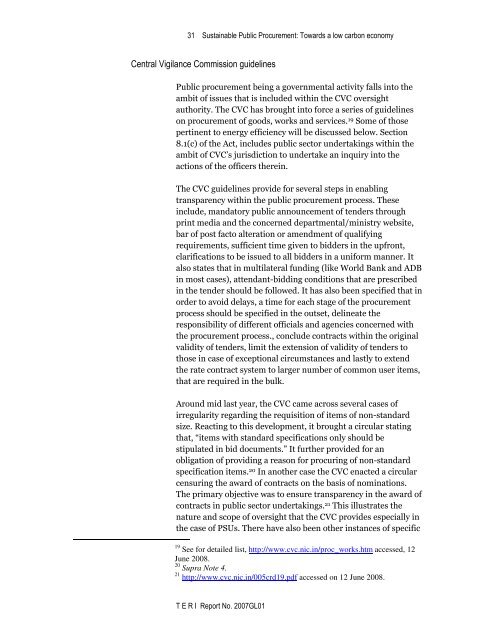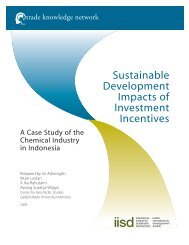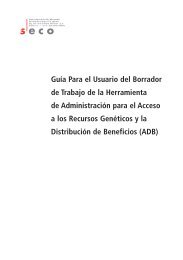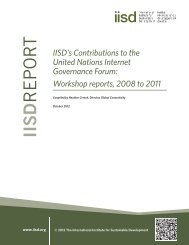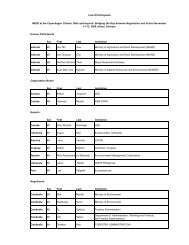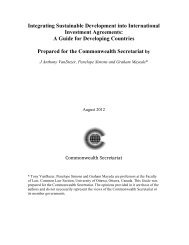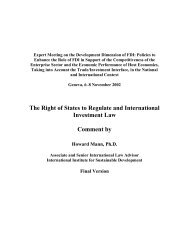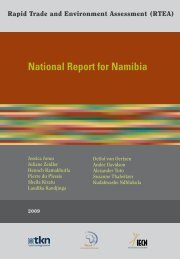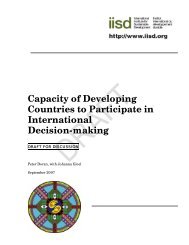Sustainable Public Procurement: Towards a lowâcarbon economy
Sustainable Public Procurement: Towards a lowâcarbon economy
Sustainable Public Procurement: Towards a lowâcarbon economy
Create successful ePaper yourself
Turn your PDF publications into a flip-book with our unique Google optimized e-Paper software.
31 <strong>Sustainable</strong> <strong>Public</strong> <strong>Procurement</strong>: <strong>Towards</strong> a low carbon <strong>economy</strong><br />
Central Vigilance Commission guidelines<br />
<strong>Public</strong> procurement being a governmental activity falls into the<br />
ambit of issues that is included within the CVC oversight<br />
authority. The CVC has brought into force a series of guidelines<br />
on procurement of goods, works and services. 19 Some of those<br />
pertinent to energy efficiency will be discussed below. Section<br />
8.1(c) of the Act, includes public sector undertakings within the<br />
ambit of CVC’s jurisdiction to undertake an inquiry into the<br />
actions of the officers therein.<br />
The CVC guidelines provide for several steps in enabling<br />
transparency within the public procurement process. These<br />
include, mandatory public announcement of tenders through<br />
print media and the concerned departmental/ministry website,<br />
bar of post facto alteration or amendment of qualifying<br />
requirements, sufficient time given to bidders in the upfront,<br />
clarifications to be issued to all bidders in a uniform manner. It<br />
also states that in multilateral funding (like World Bank and ADB<br />
in most cases), attendant-bidding conditions that are prescribed<br />
in the tender should be followed. It has also been specified that in<br />
order to avoid delays, a time for each stage of the procurement<br />
process should be specified in the outset, delineate the<br />
responsibility of different officials and agencies concerned with<br />
the procurement process., conclude contracts within the original<br />
validity of tenders, limit the extension of validity of tenders to<br />
those in case of exceptional circumstances and lastly to extend<br />
the rate contract system to larger number of common user items,<br />
that are required in the bulk.<br />
Around mid last year, the CVC came across several cases of<br />
irregularity regarding the requisition of items of non-standard<br />
size. Reacting to this development, it brought a circular stating<br />
that, “items with standard specifications only should be<br />
stipulated in bid documents.” It further provided for an<br />
obligation of providing a reason for procuring of non-standard<br />
specification items. 20 In another case the CVC enacted a circular<br />
censuring the award of contracts on the basis of nominations.<br />
The primary objective was to ensure transparency in the award of<br />
contracts in public sector undertakings. 21 This illustrates the<br />
nature and scope of oversight that the CVC provides especially in<br />
the case of PSUs. There have also been other instances of specific<br />
19 See for detailed list, http://www.cvc.nic.in/proc_works.htm accessed, 12<br />
June 2008.<br />
20 Supra Note 4.<br />
21 http://www.cvc.nic.in/005crd19.pdf accessed on 12 June 2008.<br />
T E R I Report No. 2007GL01


